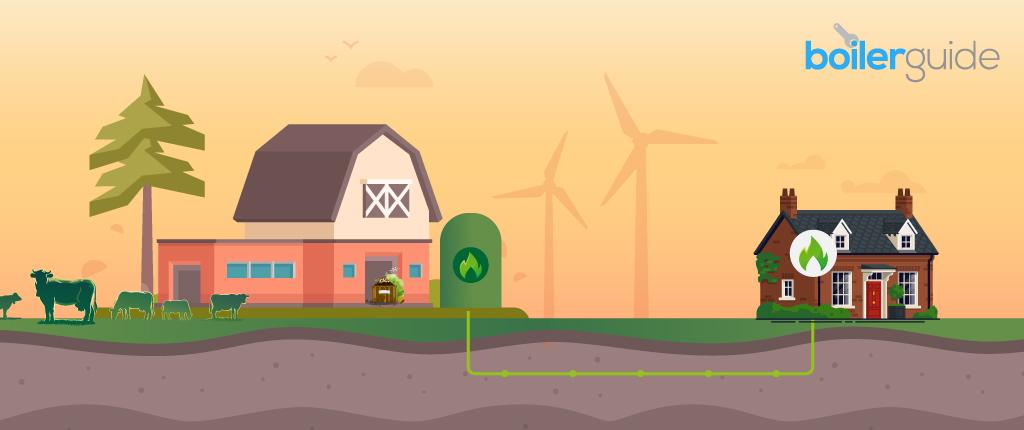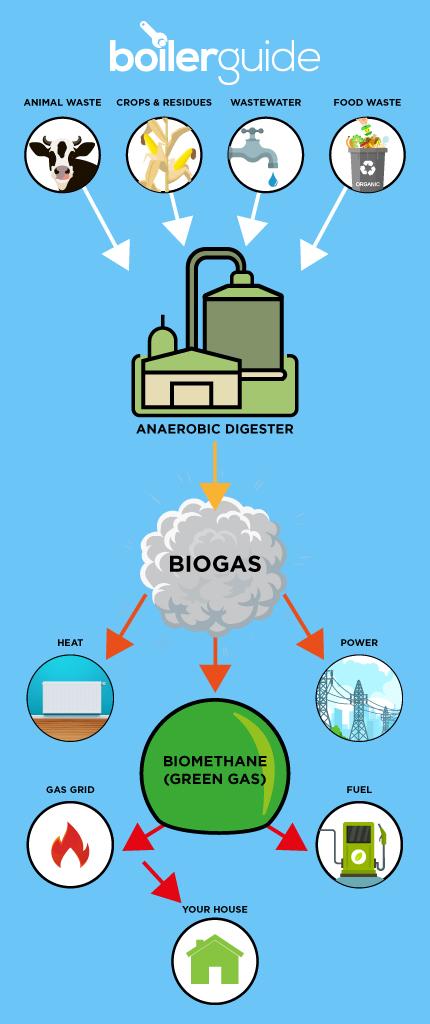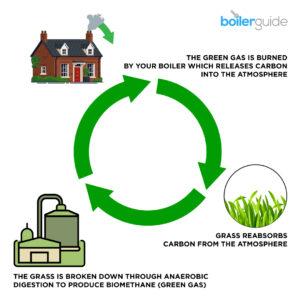What is Green Gas and Could it Save the Planet?

One day we could all be heating our homes with green gas.
We currently rely heavily on natural gas from fossil fuels, which is bad for the planet. Turning to green gas would put an end to our reliance on fossil fuels as it's made from organic materials like crops and food waste.
You can heat your home with green gas now by turning to the right energy supplier. Around 1 million UK homes have already done so. But could it really replace natural gas?
What is green gas and how is it made?
Green gas is another name for biomethane.
It's made when organic materials like food waste, manure and crops are broken down in the absence of oxygen through anaerobic digestion.
Once broken down, the organic materials make biogas. Biogas isn't quite green gas and can't be added to the gas network. So before it can be sent to your gas boiler, it needs to be purified to make biomethane. Or, in other words, green gas.
As well as gas, a residue gets left behind, known as digestate, which can be used as a fertiliser.

Is green gas renewable?
There will always be plenty of fuel to make green gas.
All of the organic materials that can be used to make green gas – food waste, grass, crops and animal waste – can be easily renewed. And in a fairly short timescale too. Particularly compared to fossil fuels which can take millions of years to form and supplies are running low.
Is green gas better for the planet?
Natural gas comes from fossil fuels. And any use of fossil fuels is bad news for the planet.
Burning natural gas adds to the carbon in the atmosphere – a leading cause of climate change.
Fortunately, green gas holds many of the answers.
It can still be used by boilers to heat our homes and hot water but it's completely carbon neutral. This means the only carbon released into the atmosphere was absorbed by the organic materials in the first place.
Take grass, for example.
As grass grows it absorbs carbon. So if it was made into green gas (through anaerobic digestion) then burning that gas would release carbon. But only the carbon the grass absorbed.
More grass would then grow and take in the same amount of carbon. So turning to green gas would create a cycle that's completely carbon neutral.
Turning our back on fossil fuels would be good for the environment, our health and planet as a whole. But we're not going to see a switch to greener alternatives overnight.

Don’t confuse it with greenhouse gases
Green gas is very different from greenhouse gases.
Greenhouse gases trap heat in the atmosphere. Which, in turn, warms up the planet. There are a few greenhouse gases, most famously carbon dioxide and methane.
Carbon is released by your boiler out into the atmosphere every time you heat your home. Adding to the levels already in the atmosphere.
By turning to green gas, the level of carbon we emit into the atmosphere will be reduced.
What are the benefits?
Moving away from natural gas and towards green gas would benefit the planet and individuals:
- Made from sustainable energy sources
- Saves millions of tonnes of waste from ending up in landfills or being left to rot
- Reduce carbon from home heating
- Gives the boiler a place in the low-carbon future of home heating
- Will create green jobs
Are there any downsides?
If green gas was to be made on a wider scale, there would be very few downsides (if any). The gas itself would be made from more sustainable materials and we could go on using our current gas boilers.
The only downsides at the moment are around cost and a limited number of suppliers:
- Very few energy suppliers offer green gas tariffs
- Currently more expensive to heat a home with green gas than natural gas
- Investment would be needed to build more anaerobic digesters (where organic matter is broken down into gas)
Can I heat my home with green gas?
Around 1 million homes in the UK are using green gas for heating and cooking.
A few energy suppliers offer tariffs that include green gas. However, there's currently only one that supplies 100% green gas.
| Energy Supplier | Green Gas Supply | |
|---|---|---|
| Green Energy UK | 100% | |
| OVO Energy | 15% | |
| Bulb | 10% |
There may not be many suppliers to choose between at the moment but it's estimated that 10 million homes will have a supply of green gas from 2050.
Green gas vs hydrogen

Hydrogen is another alternative to natural gas. And, unlike green gas, it doesn’t emit any carbon when it's burned.
The problem with hydrogen is how it's made. Some methods produce carbon.
For hydrogen to be a truly low-carbon fuel then any carbon needs to be captured using Carbon Capture Storage (CCS). Or, if it's made using electrolysis (when electricity splits water into hydrogen and oxygen), the electricity must come from renewable energy sources – known as green hydrogen.
The Hydrogen Rainbow shows the ways of making hydrogen that are kindest on the environment.
Then there's what needs to be done about adding these gases to the gas network. And this is where green gas has the upper hand.
Green gas is in the gas network right now. And your boiler will be using it to heat your home if you're with certain energy suppliers. So a complete switch from natural gas to green gas is possible with minimum fuss.
Modern gas boilers can run on a gas supply that contains up to 20% hydrogen. If the gas network was to switch to 100% hydrogen then all gas boilers would need to be hydrogen-ready.
Leading boiler manufacturers, Baxi and Worcester Bosch, have developed prototypes of the hydrogen-ready boiler. But they're not available to buy. And it's unlikely they will be until hydrogen production becomes more affordable and the carbon conundrum is solved.
Either way, green gas and hydrogen both prove there's a place for the boiler in the future of home heating.
Can I get a green boiler?
We've spoken about green gas but what about green boilers?
Literally speaking, there's no such thing as a green boiler (give our article on green boilers a read to find out why). But modern condensing boilers come close.
Condensing boilers are so efficient that replacing your old boiler with a new one will feel like you've installed a green boiler.
They don't burn so much fuel, emit less carbon and help to lower your heating bills. All thanks to the condensing boiler technology which is able to hold onto more heat from the same amount of gas as a non-condensing boiler.
So if you're planning to switch to an energy supplier with a green gas tariff, don't forget to install a greener boiler too.
You can get free quotes from boiler installers in your area at the tap of a button right here at Boiler Guide. Head to our short online form, let us know you want a new boiler and we'll take care of the rest. You could have a more efficient boiler within a few days.
Get Boiler Quotes



